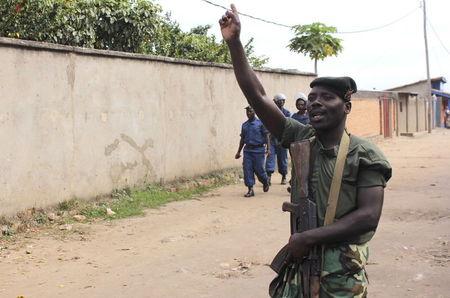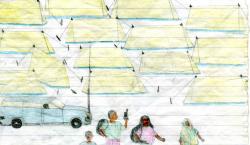Advertisement
Protests after Burundi president sticks to vote bid, one dead
BUJUMBURA (Reuters) - Protesters were back on the streets of Burundi's capital on Thursday and one person was killed after President Pierre Nkurunziza told demonstrators to halt rallies against his third term bid, promising to make it his last if he wins.
Opponents say the president, who has been in office since the end of an ethnically fuelled civil war in 2005, is violating the peace deal and constitution by seeking a new five-year term.
A constitutional court ruled on Tuesday that he was allowed to run because his first term, when he was picked by lawmakers and not elected, did not count. The opposition say the court is biased and that protests will go on until he steps aside.
"I will respect the decision of the constitutional court," Nkurunziza said in a televised address on Wednesday night. "I would like to assure the national and international community that in case I am elected now, this will be my last term."
More than a week of protests in the small East African nation has stoked tensions in a region with a history of ethnic conflict and prompted the United States and other donors to urge Nkurunziza not to run.
The Burundi Red Cross said one person was killed in disturbances on Thursday in Bujumbura's Cibitoke district and nine were injured in that area and an adjacent neighbourhood.
Civil society groups say 13 people have died since protests began on April 26. Police give a lower number.
Hundreds protested in Cibitoke on Thursday, a Reuters witness said. Tyres were burning and one vehicle was torched.
Protesters said on Thursday the Imbonerakure youth wing of Nkurunziza's ruling CNDD-FDD party had attacked them.
The government has dismissed the charge that the youth wing has fomented violence, instead accusing protesters of starting an "insurrection". It says it will offer those detained during protests an amnesty if the rallies stop.
Worried about a relapse into bloodshed in a nation where majority Hutus and minority Tutsis fought against each other in the civil war, foreign ministers from the East African Community nations were in Bujumbura this week to discuss the crisis.
Alongside Burundi, the other members are Kenya, Uganda, Tanzania and Rwanda, a nation with the same ethnic mix as Burundi and which suffered a genocide in 1994 in which 800,000 mostly Tutsis and moderate Hutus were slaughtered.
Almost 40,000 people, many of them Tutsis, have already fled to neighbouring states Rwanda, Tanzania and Democratic Republic of Congo for fear that violence will spread across the country.



















Add new comment